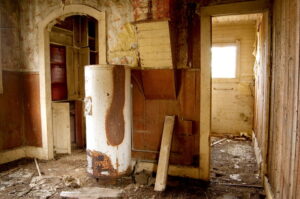
You can expect a service life from your gas-powered storage tank water heater (the most common type) of 12–15 years, possibly longer if you stay diligent with annual maintenance and always call for prompt repairs when anything goes wrong with the system. Electric tank water heaters can last for several years longer.
During the life of your water heater, corrosion is the biggest foe to watch for—the one that can bring your water heater’s service life to an end. Corrosion occurs when water meets metal in the presence of oxygen, so any water-using appliance made of metal is at risk of corrosion, particularly rust.
Does corrosion on your water heater mean the end of the line for it? Can you have it repaired or is it time to call us for a new water heater installation in Orange County? We’ll address these questions below.
Does corrosion mean the water heart is finished?
In many cases, yes, it does. This is often because corrosion occurs in the late stage of a water heater’s service life as an effect of aging. If you have a gas water heater that’s more than 15 years old, the appearance of rust—either on the unit or in your hot water—means you need to have a new system to replace it. A corroded tank needs a replacement, so you might as well have the whole system replaced. Corrosion elsewhere indicates excessive age and repairs that are too expensive to justify. You’ve already gotten a good run from the water heater—time to move on to the next.
Can corrosion on the water heater be repaired?
For younger water heaters, repairs may be able to fix certain corrosion issues, such as when the corrosion is only on a part like the heat exchanger that can be replaced without affecting the rest of the system. Contact our professionals and they’ll give you a lowdown on the best, most cost-effective path forward.
What can I do to prevent water heater corrosion?
A piece of good news here: the companies that manufacture water heaters design them with numerous defenses against corrosion. These defenses include a glass-lined tank, a pressure-relief valve to keep oxygen out of the tank while still providing an air cushion against spikes in water pressure, and a component called the anode rod. The anode rod is an interesting part of a water heater: a coil of two types of metal that extends down through the tank and which attracts corrosion to itself so it won’t affect the rest of the water heater.
The best way you can keep your water heater from corrosion and an early replacement is to schedule annual maintenance for it. One of the key steps technicians take during maintenance is to check on the anode rod. The rod will rust through after several years, and when that happens it will no longer provide any defense against corrosion. Maintenance replaces the anode rod so it will continue to do its sentry duty against the invading forces of corrosion and rust.
Saddleback Plumbing Heating & Air has served Orange County since 1981. Call us when you need any assistance with your water heater.
